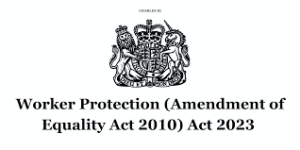

All content © HRadviser 2022
Currently, under the Equality Act 2010, an employer can defend a harassment claim if it can show that it took ‘all reasonable steps’ to prevent it from happening in the first place.
However, this is set to change from 26th October 2024, and the legal obligation will require a more proactive approach from employers than this, but for sexual harassment only.
This is obligation is to be set out in The Worker Protection (Amendment of Equality Act 2010) Act 2023 and employers must to take reasonable steps to prevent (specifically) sexual harassment in the workplace. It will not apply where other forms of harassment are alleged (for example, harassment related to disability, age, religion or belief). Nor does it apply if the harassment is generally related to sex, meaning male or female, but is not sexual in nature. The positive duty to prevent harassment would apply for example to a manager making lewd comments about a female employee’s appearance (or vice versa) or touching a person inappropriately. It does not apply to purely prejudicial attitudes to women.
According to the EHRC’s updated technical guidance, this new preventative duty includes a duty to take reasonable steps to prevent sexual harassment by third parties. So, if an employer doesn’t take reasonable steps to prevent sexual harassment of their workers by either coworkers or third parties, this new preventative duty will be breached.
August 2024

All content © HRadviser 2022